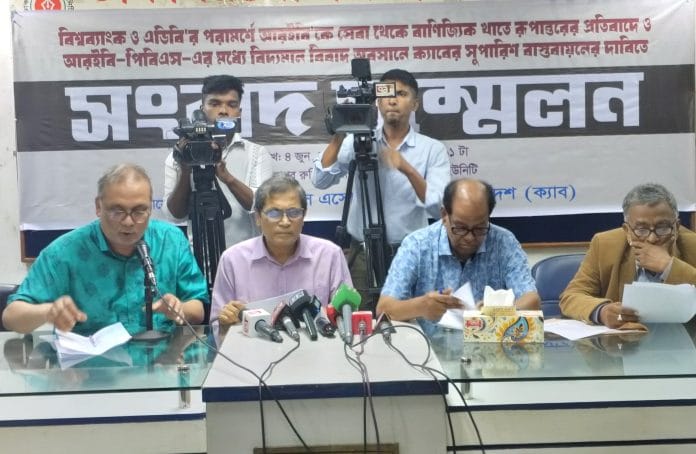The government has failed to resolve the ongoing internal conflict between the Palli Bidyut Samiti (PBS) and the Rural Electrification Board (REB), according to Professor M. Shamsul Alam, Energy Adviser of the Consumers Association of Bangladesh (CAB).
Speaking at a press conference organized by CAB at the Dhaka Reporters’ Unity on Tuesday, Professor Alam said corruption, mutual blame, and growing instability have reached alarming levels within the rural power sector. As a solution, he recommended merging PBS and REB under a single employment policy and uniform service regulations.
CAB leaders including General Secretary Advocate Humayun Kabir, and Executive Member Md. Shawkat Ali Khan, also attended the event, moderated by Organizing Secretary Professor Dr. Syed Mizanur Rahman Raju.
In a written statement, Dr. Alam criticized the government for failing to address the crisis, instead allegedly advancing the privatization agenda of the Asian Development Bank (ADB) and the World Bank. He claimed there are attempts to transform REB from a public service provider into a commercial entity under their guidance.
Dr. Alam presented five key demands to resolve the ongoing dispute. He revealed that an earlier investigation conducted by CAB had been partly submitted to the government. However, a second report focused on corruption was suspended due to lack of cooperation from the Power Division.
He highlighted systemic inequality and discrimination among PBS staff, which fuels internal conflict. He proposed nationalizing PBS and establishing uniform recruitment, promotion, and benefit policies. Under Section 40 of the Bangladesh Energy Regulatory Commission Act 2003, CAB may seek resolution of PBS’s complaints against REB.
CAB also questioned the legitimacy of a restructuring proposal, led by the Vice-Chancellor of BRAC University, recommending PBS transformation into separate corporate entities. CAB raised concerns over the absence of consumer representation and transparency in forming the recommendations.
“Only a handful of PBS units are profitable; most are running on losses and subsidies,” said Dr. Alam. “Turning them into companies will not automatically generate profit, nor benefit consumers. Yet the government has not explained how this will serve public interest.”
He criticized the growing influence of ADB, World Bank, and IMF in shaping Bangladesh’s energy policy, which he believes is pushing the country towards becoming an energy import market — citing India’s cross-border energy trading policy as an example.
CAB firmly opposes the commercialization of PBS, warning that such measures prioritize profit over public welfare. Dr. Alam reiterated that the real solution lies in unifying REB and PBS under a common employment and administrative structure.
In response to questions, Dr. Alam said CAB’s recommendations to resolve the dispute were ignored by the Power Division, which oversees REB. “Attempting to break up REB and turn it into a company is unacceptable. Consumers understand which policies will reduce or increase electricity prices.”
In his concluding remarks, CAB General Secretary and veteran freedom fighter Advocate Humayun Kabir criticized previous governments for weakening consumer rights institutions like BERC.
He accused the current administration of following the same path, where bureaucrats, not consumers, are prioritized. “Companies think of profit, not people,” he said.
“Turning REB into a company will further erode consumer rights.” Notably, the rural power supply has been under threat since May 21, with ongoing protests, work stoppages, and mass leave programs by rural power employees at the Central Shaheed Minar in Dhaka.

